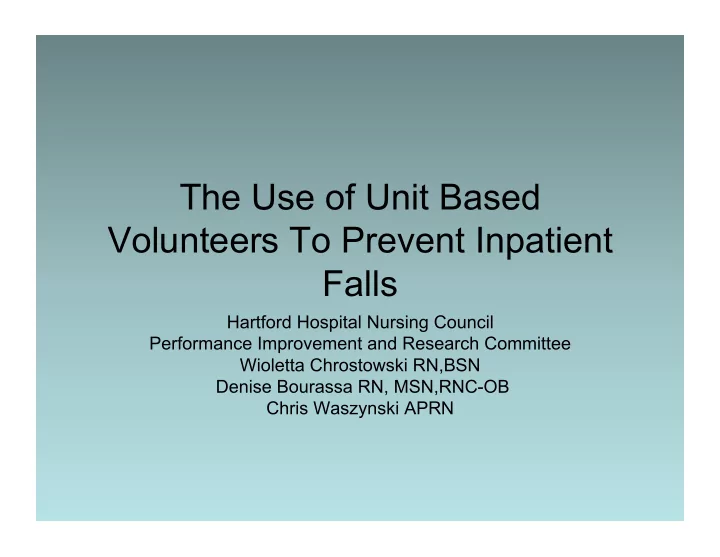

The Use of Unit Based Volunteers To Prevent Inpatient Falls Hartford Hospital Nursing Council Performance Improvement and Research Committee Wioletta Chrostowski RN,BSN Denise Bourassa RN, MSN,RNC-OB Chris Waszynski APRN
Background • 2 active volunteer roles already in place at Hartford Hospital Keeping In Touch Program (2002) Safety Volunteer Program (2008)
Keeping In Touch Volunteer Program • Pts with advanced age, sensory loss, cognitive impairments, depressed, lonely , discouraged, bored, needy • Trained volunteers visit to do selected activities (reminiscence, conversation, music, reading, games, touch, assist with meals) • Hospital wide • Pts followed until discharge
Safety Volunteer Program • Round on all patients identified as high risk for falls (green triangle on door) • Check that green bracelet on • Check that bed/chair alarm on/connected • Check that personal items and call bell within reach • Remind patient not to get up without staff • Ask patient to demo use of call bell • Complete an audit tool that is shared with manager
New Volunteer Role on Pilot Unit • Combination of Keeping In Touch and Safety Volunteer • GOAL: Pair the volunteer with patients at high risk of falling to prevent falls and meet patient needs
Role Description • Interact with unit staff to determine which patients should be visited and why • Interact with patients to meet their needs and decrease their risk for falling • Share information with unit staff so that fall prevention measures continue after the volunteer leaves the unit
Recruiting • Active volunteer department • Screened appropriate candidates • Interviewed for interest and “fit” • 8 individuals 5 college students 2 high school students 1 retired nurse • 4 hour shifts Tues, Wed, Thurs, Sun (late morning to mid afternoon)
Training of Volunteers • General hospital orientation • Role orientation Communication Sensory Loss Dementia/Delirium/Depression Fall Prevention Protocol Assistive Dining Guided Exercise Activities/Equipment • Shadowed experienced volunteer
Preparation of Staff • Explained goals of the program: Fall prevention Assist staff with high risk patients • Nurse manager discussed in staff meeting • Signs posted with volunteer role description and schedule • Explained role of the nurse/ PCA to identify appropriate patients for volunteer
Process • Volunteer arrives on the unit • Volunteers arrival is announced overhead to all staff • Volunteer checks in with resource nurse and or other staff for list of up to 6 patients to visit • Volunteer cycles among these patients so each are seen several times throughout the shift • Volunteer communicates any necessary information regarding visits back to staff
Timeline • Classroom orientation (3 hours) • Shadowing 1 or 2 shifts (3 hours) • First shift alone- check in by coordinator to be sure all going well • Periodic check ins with volunteer and staff to evaluate process and outcomes
Profile of CB5 • 45 swing bed medical surgical unit • ADC=37 • Highest number of falls of all inpatient units • Environmental challenges • Turnover issues (staff and management)
Unit Based Volunteers on CB5 Jan 2009-Dec 2009
Actual # of falls/month
Relationship: Falls and Hrs
Monthly falls /1000 pt days
Fall Prevention Protocol Compliance
Additional Outcomes • Call bells and bed/chair alarms have decreased during the time the volunteer is on the unit • Volunteers’ report of activities that proved effective for patients • Volunteers’ report of falls that were prevented • Staff’s perception of helpfulness of program
Lessons Learned • It took time for staff to identify high risk patients for volunteers to visit- initially referred patients who were thought to easily engage with others- staff needed ongoing guidance to refer other types of patients (dementia, delirium, figity, impulsive) who are truly high risk for falls.
Lessons Learned • Volunteers needed time to get comfortable with approaching staff for the list of patients to visit- often staff were very busy. • Staff needed time and assistance in identifying patients that would benefit from a volunteer.
Questions
Recommend
More recommend